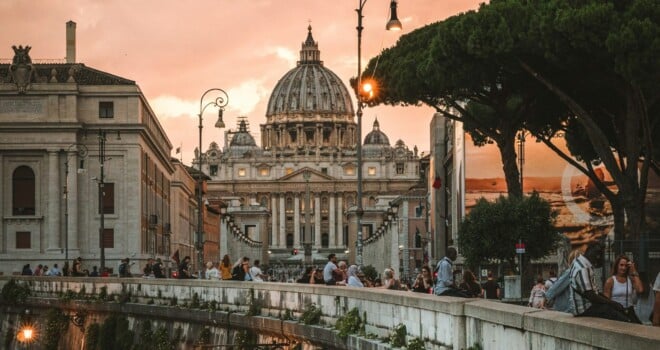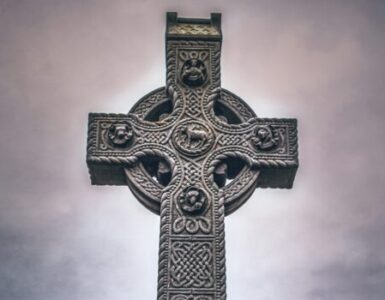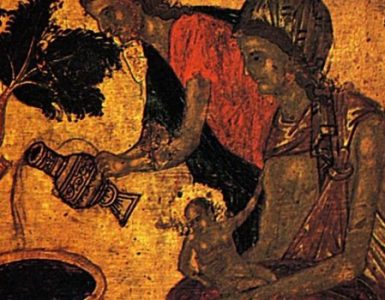On May 13th, 1981, Pope John Paul II was shot four times by Mehmet Ali Ağca as he was entering St. Peter’s Square in Vatican City. While suffering severe blood loss and nearing death, the pontiff’s thoughts were on the apparitions of Our Lady of Fatima, which had taken place exactly sixty-four years before, to the day.
In fact, a message he had prepared for pilgrims visiting Fatima that day in honor of the anniversary was being read aloud at the very moment shots were fired at the pope (Donna-Marie Cooper O’Boyle, St. Anthony Messenger). The pope surely must have intuited that there was something in this traumatic event that the Lord wanted him to understand. During his long recovery at Gemelli Hospital, the Holy Father asked that the letter containing the “third secret” of Fatima be brought to him. It was there that he read the letter for the very first time.
Many of us are now familiar with the contents of that secret:
[A] bishop dressed in white [whom the children interpreted as the pontiff] afflicted with pain and sorrow…was killed by a group of soldiers who fired bullets and arrows at him, and in the same way there died one after another the other bishops, priests, men and women religious, and various lay people of different ranks and positions.
The third secret was eventually made public in 2000, with the caveat by then-Cardinal Joseph Ratzinger that those hoping for ominous prophetic warnings would be “disappointed,” as the events foretold in the third secret had already come to pass. John Paul II was the pope of whom the third secret spoke.
The thing about the Church interpreting prophecy on behalf of the rest of us is that sometimes her interpretations do not seem to make sense. If the prophecy had already come to pass, where was the “group of soldiers” who was supposedly involved in the assassination attempt? The bullets that pierced the pontiff had come from a lone wolf. Not to mention the fact that his assassination attempt was just that: an attempt. But according to the third secret, the Holy Father would be “killed,” along with “other bishops, priests, men and women religious, and various lay people of different ranks and positions.” None of these apocryphal events took place.
Was the Holy Father attributing a rather loose interpretation to the secret simply because he had the authority to do so? Are we sure this wasn’t the pope’s attempt at forcing a prophecy to fit his own (admittedly highly emotional) trauma in order to bring meaning to an otherwise senseless act?
To debate whether the pope’s interpretations are up for discussion, or to favor our own ideas as to what the secrets of Fatima may or may not mean, would require a much greater leap of faith than to simply accept the words of the Holy Father, though we may not understand them. Why? Because of the grace of his office as leader of the worldwide Church. While it’s true that the Church’s teaching on the infallibility of the pope extends only to matters of faith and morals spoken ex cathedra, just because the pope’s other opinions and commentaries do not fall within this domain, does not mean that we should take his interpretations lightly. Of course, the faithful are not obliged to accept his words in cases such as this; we are certainly free to disagree. But before we do, let’s consider that if the Holy Spirit protects the words of the pope infallibly when they are spoken from his chair, then we can logically conclude that he is guided by that same Spirit—even when he speaks outside it.
This history of the assassination attempt on Pope John Paul II is not just an interesting story to read about on his feast day. It is a history which points to what is happening in our Church today. Why? Because it is a story that offers us a lesson in listening to the ones who “belong to God” (1 Jn 4:6). No doubt, these are confusing times, and it can be difficult to decipher which of our ecclesiastical leaders to listen to these days. But one thing we do know for certain: in none of her secrets at Fatima did Our Lady ever declare that the pope would cease to belong to God. She did prophesy that he would be “afflicted with pain and sorrow.” And if there is anything that could describe the popes who have come since the time of John Paul II, surely, that would be it. The sufferings of the holy pontiffs are not ones that we are necessarily privy to, and therefore we must refrain from professing to know or understand the motivation of their hearts.
On May 12th, 1982, one day before the one-year anniversary of his wounding at Vatican square, Pope John Paul II was attacked again—this time, stabbed. Fortunately, the attack was only a “flesh wound,” the Pope’s injury was covered with a bandage, and he continued with the celebration as if nothing had happened. Pope John Paul II saw the hand of God so clearly in his circumstances that even the circumstances that caused him to suffer were, according to his secretary Archbishop Pasquale Macchi, “moments of inspired joy.”
Let us then place our trust in the pope’s grace of office, one which Jesus Christ Himself instituted the moment He breathed the life of the spirit onto His Apostles. Jesus has given the pope the authority to know His Church in a way that we cannot fully know ourselves, no matter how much research, study, or analysis we do. Why? Because it is a knowledge that comes with the office, one reserved for the second-in-command alone.
Our dear pope is Christ’s vicar on earth, and so to trust ourselves—our opinions, our research, our gut instinct—over the authority of the pope, could very well lead us to listen to the “spirit of deceit” (1 Jn 4:6). It’s a sobering thought…a temptation that none of us is immune to. In a world where there is no shortage of personal opinions being mislabeled as “fact,” it’s easier to fall into this temptation—easier than we might realize.
The best thing we can do to help our Church is to not spend time worrying about things over which we have very little knowledge and absolutely no control. It is not our job to speculate. It is not even our job to understand. Our job is to love and to trust, paying greater heed to the one “who by the Lord’s mercy is trustworthy” than we do to the ones who are not (1 Cor 7:25). Let us remain peacefully in the lowest place of humility, where the heart of Jesus resides. And then, let us trust the Lord to steer the Barque of Peter through the stormy waters on a course that is right and true.
Photo by Szabolcs Toth on Unsplash










